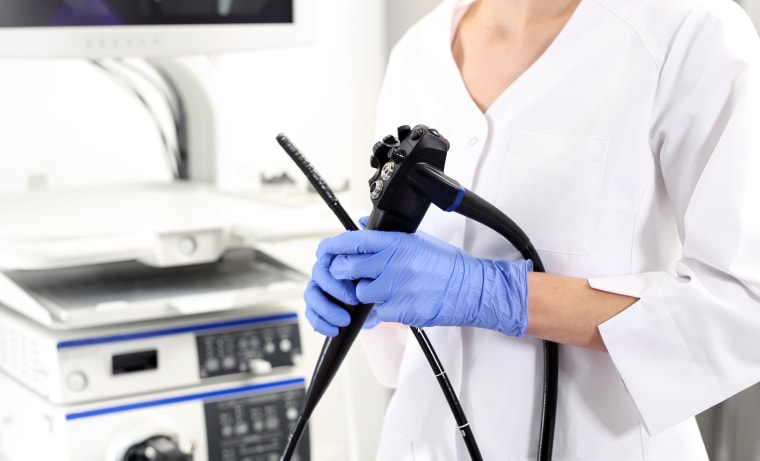Many younger patients with colon cancer are initially misdiagnosed, which often leads to their disease being discovered at an advanced stage.
Researchers also found that for many younger patients, it took visits to multiple doctors before the correct diagnosis was made, according to survey results released Wednesday, to be presented next month at the annual meeting of the American Association for Cancer Research.
“We need to increase awareness that colon cancer affects not only elderly people but also younger ones,” said Ronit Yarden, director of medical affairs at the Colorectal Cancer Alliance, a patient advocacy organization based in Washington, D.C. “Of all the different types of cancer, colon cancer is one of the most preventable ones and also, if misdiagnosed and then discovered at a later stage, one of the most deadly ones. We need that information to trickle down to both patients and physicians.”
The biggest problem, Yarden said, is that many patients and physicians still believe colon cancer doesn’t occur in young people.
And that’s especially important since colorectal cancer rates have been rising in younger adults.
Between 2009 and 2013, colorectal cancer rates decreased by 4.6 percent per year in individuals 65 and older and by 1.4 percent in people aged 50 to 64, according to the American Cancer Society. But they increased by 1.6 percent in those under age 50.
The cancer society has estimated that in 2017 there will have been 95,520 new cases of colon cancer and 39,910 cases of rectal cancer diagnosed in the U.S. It's the third most commonly diagnosed cancer in Americans, according to the American Cancer Society.
For the new survey, Yarden and her colleagues reached out through the organization’s social media sites to young-onset patients and survivors to learn more about the difficulties patients experience getting diagnosed.
Out of the 1,195 people who completed surveys, 57 percent said they were diagnosed between the ages of 40 and 49, 33 percent received a diagnosis between the ages of 30 and 39 and about 10 percent were diagnosed before age 30.
Why would a young person even think that the symptoms they were experiencing would be related to colon cancer? Colon cancer is often thought of as a disease in older people.
At least 63 percent delayed up to a year after first experiencing symptoms before they went to a doctor because they didn't suspect colon cancer, the survey found. And more than two-thirds of the patients saw at least two doctors before getting an accurate diagnosis. Some had to go to as many as four doctors.
Other key findings:
- 71 percent were diagnosed at stage III or IV, in contrast to patients over 50, most of whom are diagnosed at stage I or stage II.
- 67 percent saw at least two physicians before being properly diagnosed, and some saw as many as four.
- Many of the patients had major risk factors for colon cancer, including 30 percent who had a family history of the disease and 8 percent who had Lynch syndrome.
Part of the problem for both physicians and patients is that symptoms can be vague and suggestive of a number of other conditions, Yarden said. Still, if a person experiences more than one symptom, that should ring alarm bells.
Early warning symptoms
The patients in the survey experienced symptoms typical of colon cancer, Yarden said.
- 50 percent had constipation
- 50 percent had rectal bleeding
- About 40 percent had blood in stool
- About 40 percent had bloated stomachs and a lot of abdominal pain
- 30 percent had fatigue even though they were young and active
The new survey underscores the need for education about young-onset colon cancer, said Dr. Felice Schnoll-Sussman, a gastroenterologist at NewYork-Presbyterian Hospital and Weill Cornell Medicine.
“It is sad but not at all surprising to find out that many patients who develop colon cancer before the age of 50 were initially misdiagnosed,” Schnoll-Sussman said in an email. “First of all, why would a young person even think that the symptoms they were experiencing would be related to colon cancer? Colon cancer is often thought of as a disease in older people. As a consequence they may not present to a physician until they have had symptoms for some time and subsequently run the risk of getting diagnosed at a later less treatable stage.”
Check for blood
It's not just patients who need to understand that young people can develop colon cancer, Schnoll-Sussman said.
“Doctors need to have the possibility of colorectal cancer in younger patients more on their radar screen,” she told NBC News.
Young people need to be more attentive to their symptoms, especially the appearance of blood, said gastroenterologist Dr. Thomas Imperiale, an investigator at the Regenstrief Institute. “People need to look at their stool and the toilet paper for blood,” he said.
Doctors need to ask more questions when a new patient comes in, Imperiale said. “They need to ask about symptoms including whether the patient has ever seen blood on the toilet paper,” he added. “The provider also needs to take a good family history for all cancers.”
Current guidelines call for people to start getting some kind of cancer screening at age 50. The American Cancer Society recommends colon cancer screening begin at age 45.
Imperiale does not support lowering the screening age for colon cancer, as that could result in more invasive colonoscopies in an age group that has a low risk of the cancer. Colonoscopies are not completely benign, Imperiale said, noting the procedure is associated with a number of serious complications, including colon perforation in one out of 1,000 patients.


